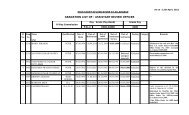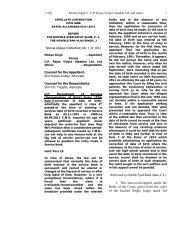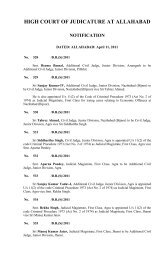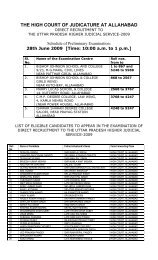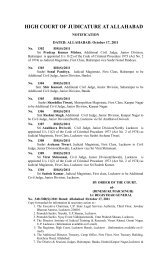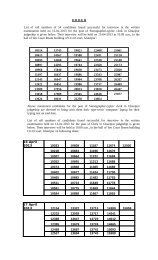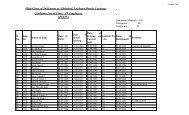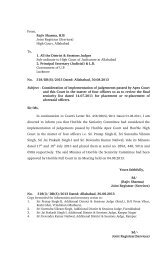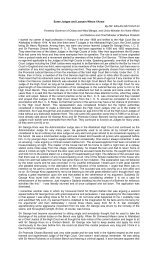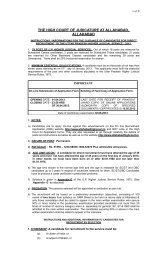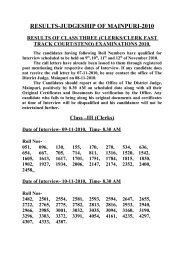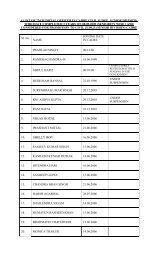Nov - High Court of Judicature at Allahabad
Nov - High Court of Judicature at Allahabad
Nov - High Court of Judicature at Allahabad
Create successful ePaper yourself
Turn your PDF publications into a flip-book with our unique Google optimized e-Paper software.
1068 INDIAN LAW REPORTS ALLAHABAD SERIES [2009<br />
Supreme <strong>Court</strong> in the case <strong>of</strong> St<strong>at</strong>e <strong>of</strong><br />
Kerala and Another Vs. P.V. Neelakandan<br />
Nair and others [(2005) 5 SCC 561] in<br />
paragraphs 8 to 16 held th<strong>at</strong> while<br />
interpreting a Rule, <strong>at</strong>tention should be<br />
paid not only to wh<strong>at</strong> has been said, but<br />
also to wh<strong>at</strong> has not been said. The Rule<br />
has to be interpreted not like a Euclid's<br />
theorem, but with some imagin<strong>at</strong>ion <strong>of</strong><br />
the purposes, which lie behind the Rule.<br />
A Full Bench <strong>of</strong> the Andhra Pradesh <strong>High</strong><br />
<strong>Court</strong> in B. Prabhav<strong>at</strong>hi Vs. Govt. <strong>of</strong><br />
Andhra Pradesh, [2002 (3) ESC 108] in<br />
paragraph 44 ruled th<strong>at</strong> Rules framed<br />
under the Act should be harmoniously<br />
interpreted as they form part <strong>of</strong> the Act.<br />
60. Having considered the principles<br />
enunci<strong>at</strong>ed and referred to hereinabove<br />
and applying them to the present<br />
controversy, it is clear to us th<strong>at</strong> nothing<br />
has been omitted by the legisl<strong>at</strong>ure, which<br />
may require filling up by the <strong>Court</strong> as<br />
suggested by Sri R.C. Singh. As<br />
explained hereinabove in Pujari Yadav<br />
(supra), the rule making authority itself<br />
proceeded to fill in the gaps by making<br />
express recitals in Regul<strong>at</strong>ions 31, 37, 100<br />
and the other provisions rel<strong>at</strong>ing thereto.<br />
The amendments in Regul<strong>at</strong>ion 31 lead to<br />
a heavy full stop to the role <strong>of</strong> the<br />
Inspector and is not a silent comma<br />
expressing doubt. The same brings about<br />
a clarity which has an almost window<br />
pave effect and removes the cloud <strong>of</strong><br />
doubt th<strong>at</strong> has been raised to be resolved<br />
by us.<br />
61. There is yet another principle,<br />
which deserves to be taken notice <strong>of</strong>. If<br />
the sanction is required prior to giving<br />
effect to a punishment in respect <strong>of</strong> a<br />
Class-IV employee, then the District<br />
Inspector <strong>of</strong> Schools would hear an appeal<br />
against his own approval. This, to our<br />
mind, would bring about an anomaly,<br />
which may extend to an absurdity. The<br />
same authority cannot be presumed to<br />
have been conferred with a power to hear<br />
an appeal against its own approval. This<br />
would be rendering nug<strong>at</strong>ory the<br />
hierarchy provided for in Regul<strong>at</strong>ion 31<br />
itself, where an appeal is provided to the<br />
Committee <strong>of</strong> Management against the<br />
order <strong>of</strong> disciplinary authority and a<br />
further appeal to the Inspector <strong>of</strong> Schools.<br />
The purpose, therefore, is clear enough<br />
and it does not suffer from any ambiguity<br />
which may require us to render an<br />
interpret<strong>at</strong>ion, which otherwise would<br />
bring about an incongruous result. As<br />
observed above, the Rules <strong>of</strong><br />
Interpret<strong>at</strong>ion as enunci<strong>at</strong>ed by the Apex<br />
<strong>Court</strong> do not permit us to give an<br />
interpret<strong>at</strong>ion, which would obviously<br />
result in a clear anomaly as pointed out<br />
hereinabove. This we adopt, as the law<br />
permits us to apply 'the intention seeking'<br />
Rule <strong>of</strong> Interpret<strong>at</strong>ion to illustr<strong>at</strong>e the<br />
anomaly th<strong>at</strong> may result in the event we<br />
accept the proposition th<strong>at</strong> a prior<br />
sanction is required.<br />
62. A feeble submission raised by<br />
Sri R.C. Singh was th<strong>at</strong> the District<br />
Inspector <strong>of</strong> Schools has to merely grant<br />
prior approval and not to make an indepth<br />
examin<strong>at</strong>ion, as <strong>at</strong> th<strong>at</strong> stage, he<br />
would be proceeding as if to perform a<br />
routine work. Such an action would not,<br />
therefore, prevent him from hearing an<br />
appeal when the m<strong>at</strong>ter may arise out <strong>of</strong><br />
an appeal before the Committee <strong>of</strong><br />
Management.<br />
63. We are not inclined to accept the<br />
aforesaid submission for the simple<br />
reason th<strong>at</strong> the District Inspector <strong>of</strong><br />
Schools, in our opinion, does not perform<br />
a mere ministerial act while granting



